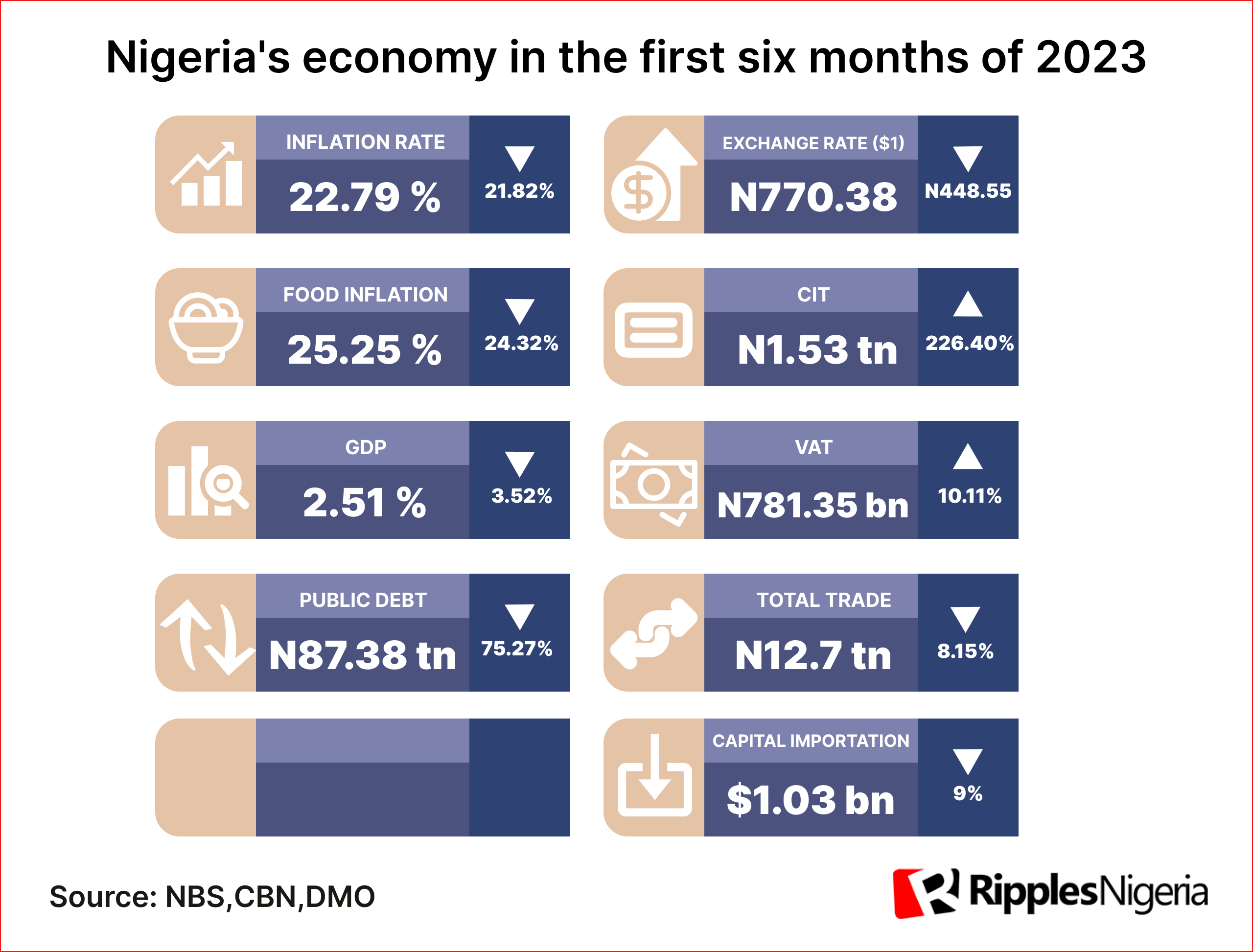Ripples Metrics
RipplesMetrics: Is Nigeria’s economy growing? What data show in the first six months of 2023

One of the New Year resolutions of most Nigerians was to see a major development across the economy. This, expectedly, should be guided by policies that can reduce the inflation rate, increase the gross domestic product, even the transactions in local production markets as well as restructuring that could grow the small and medium scale enterprises.
As of December 2022, Nigeria had an inflation rate of 21.34 per cent. This was the first drop after a consistent 10-month increase. Also, the GDP stood at 3.52 per cent while the exchange rate was N448.55/1 USD.
At this time, the Nigerian economy was confronted with the policy surrounding the new naira redesign. Amidst this were preparations for the general election– which brought in a new administration both at the federal and state levels.
For this report, RipplesMetrics evaluated several economic data released within the last few months between January to June to see how the country is responding to economic growth. These data were filtered from the National Bureau of Statistics, Debt Management Office and the Central Bank of Nigeria.
In six months, Nigeria’s administration at all executive and legislature levels (both federal and state) have changed, and various economic policies like the removal of fuel subsidy and unification of naira at the exchange rate market, have been implemented. These decisions have played a significant role in how the economy has developed.
Some of the economic data referenced are the Inflation rate, Food inflation rate, GDP, Nigerian Domestic and Foreign Debt, Foreign Trade in Goods, Company Income and Value Added Taxes and the exchange rate.
Introspection into H1’ 2023
Going by data released from the NBS, Nigeria’s inflation rate started at 21.82 per cent, 0.48 per cent higher than December 2022. This was the highest in more than 8 years, however, at the end of the first half of 2023, the inflation rate had risen to 22.79 per cent, almost an additional 1 per cent.
READ ALSO:RipplesMetrics: Nigeria owes five countries $5.5 billion
Consistently, the inflation rate grew throughout the sic months lol owing to economic policies enacted by both the former and new administrations. RipplesMetrics documented the growing inflation rate within H1’2023.
Also, the food inflation rate grew from 24.32 per cent in January 2023 to 25.25 per cent in June 2023.
On GDP, the country grew by 2.51 per cent (year-on-year) in real terms in the second quarter of 2023. This was a drop compared to what was reported at the end of December 2022, while the exchange rate as of June 2023 was N770.38/$1.
Similarly, Nigeria’s public debt stock (external and domestic debt) rose to N87.38 trillion ($113.42 billion) as of June 2023. This was 75.27 per cent higher than N49.85 trillion ($ 108.30 billion) reported in March 2023. Ripples Metrics captured the geo-political breakdown of the debt owed by each state.
For taxes, on the aggregate, Company Income Tax for the end of June 2023 was reported at N1.53 trillion, indicating a growth rate of 226.40% on a quarter-on-quarter basis from N469.01 billion in March 2023, while Value Added Tax for the second 2023 was reported at N781.35 billion, showing a growth rate of 10.11% on a quarter-on-quarter basis from N709.59 billion in Q1 2023.
On Trading, at the end of June 2023, Nigeria’s total trade stood at N12,741.96 billion, total exports stood at N7,015.71 billion and total imports amounted to N5,726.25 billion. Also, Capital importation stood at $1.03 billion, down from the $1.13 billion recorded in March 2023.
Is the economy growing?
Over the last months, Nigerians have felt the burden of the rising economic hardship on the cost of living, transportation and purchasing of food or commodities. Several national strike actions have been threatened by the labour union in response to this hardship
This has made the government initiate several forms of palliatives targeted at reviving each sector of the economy including cash-transfer to vulnerable households.
The president had promised to increase the GDP by 8 per cent annually but achieving this, analysts have said, would be difficult taking into consideration that all sectors of the economy are weakening.
However, the president still assures that his administration would work towards reviving the economy, though data says otherwise.
By James Odunayo
Join the conversation
Support Ripples Nigeria, hold up solutions journalism
Balanced, fearless journalism driven by data comes at huge financial costs.
As a media platform, we hold leadership accountable and will not trade the right to press freedom and free speech for a piece of cake.
If you like what we do, and are ready to uphold solutions journalism, kindly donate to the Ripples Nigeria cause.
Your support would help to ensure that citizens and institutions continue to have free access to credible and reliable information for societal development.
























